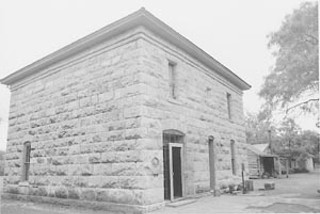Day Trips
Buffalo Gap Historic Village, south of Abilene, provides a time line of Texas history
By Gerald E. McLeod, Fri., June 11, 2004

Buffalo Gap Historic Village, south of Abilene, provides a time line of Texas history. The cluster of buildings and exhibits tells the story of modern evolution from the struggles of early settlers to the introduction of the automobile.
The town got its name from a wide gap in the Callahan Divide, a low range of mountains extending from east to west through Nolan, Taylor, and Callahan counties and dividing the watershed of the Brazos River from the Colorado River. Once the undisputed hunting grounds of the Comanche Indians, buffalo hunters began moving into the area after the Civil War.
The hunters waited in ambush as the bison on their winter migration funneled through the natural break in the terrain north of town. After the great herds were decimated, farmers and ranchers moved into the area.
The first town in Taylor County began as a winter camp for buffalo hunters. Buffalo Gap became the county seat in 1878. By 1880, the town had 1,200 residents and several businesses, churches, and a college. During its peak, the town was known as the "Athens of the West."
The good times lasted for only a decade. Buffalo Gap began a rapid decline when the Texas and Pacific Railway established its headquarters in the new company town of Abilene, 13 miles to the north. Since 1890, the population has fluctuated between 300 and 400.
On the banks of Elm Creek, the village is still a shady respite from the West Texas landscape of cactus and mesquite. Several small shops, antique dealers, and convenience stores offer services to the throngs of visitors who come to see the historic exhibits and to camp at nearby Abilene State Park.
The central attraction is the first Taylor County Courthouse and jail. The two-story building was constructed when the prospects of the town looked the best. The building is made of native stone, and it is said that cannon balls from Virginia were used to stabilize the blocks. The courtroom and county offices were downstairs, with the jails upstairs. The courthouse was only used for four years before the county seat was moved to Abilene. Currently, the building houses a large Indian artifact and gun collection.
The collection of 20 historic buildings surrounding the old courthouse began in 1956, when Ernie Wilson established a small Indian and Western museum at the site. Wilson, an area lawyer and rancher, moved the house that once belonged to Abilene's first marshall and a buffalo hunter's cabin to the grounds.
Dr. R. Lee Rode and his wife Ann expanded the collection beginning in 1977. The crown jewel of their acquisitions is the Nazarene Church, which was built in 1906 and was one of the first churches organized by Mary Cagle. Founded in 1908 in Pilot Point, Texas, the Church of the Nazarene was part of the Holiness Movement that grew among Methodists following the Civil War. Cagle was one of the church's more zealous missionaries and went on to organize congregations around the West. The church is currently available for weddings and private services.
The grounds around the courthouse are roughly divided into three time periods: 1880, 1905, and 1925. It is a nice way to give children a look at how their grandparents lived, serving as a reminder of days gone by. Along with a blacksmith shop where demonstrations are done on weekends, there is a 1926 Texaco service station from Winters, Texas. The old train depot from Clyde, Texas, has been moved to the site as have furnishings from a bank and a print shop from the early 20th century.
Since 1999, the McWhiney Foundation from McMurry University in Abilene has operated the historic village as a part of its educational programming. The baggage depot from Clyde has been turned into a mercantile store with souvenirs, snacks, and a bookstore that focuses on Texas history. For information, call 915/572-5211.
Perini Ranch Steakhouse, on the road between Buffalo Gap and the state park, is the best place to eat for miles. Serving a mixture of catfish, chicken, and steaks in a rustic barn, the experience is one the visitor won't soon forget. The restaurant is open Wednesday and Thursday, 6-10pm, and Friday through Sunday, noon-11pm. Reservations are recommended, at 915/572-3339.
678th in a series. Day Trips, Vol. 2, a book of Day Trips 101-200, is available for $8.95, plus $3.05 for shipping, handling, and tax. Mail to: Day Trips, PO Box 33284, South Austin, TX 78704.








